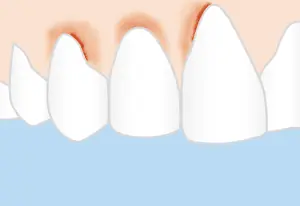Having sensitive teeth during pregnancy is not usually the first symptom that comes to mind with pregnancy discomforts. You might expect a sore back and hips and swollen feet while pregnant, but what about the effects on your teeth?


If you have increased tooth pain while pregnant, don’t worry, you aren’t alone. Many women get both sensitive teeth and sore, bleeding gums while they are pregnant. This article will discuss the reasons this can happen, and answer the following questions:
- Is it normal to have a toothache in pregnancy?
- Why are teeth sensitive during pregnancy?
- What can you do about it?
Your body goes through numerous changes when you are pregnant, and with that comes discomfort. Pregnancy is also a beautiful and natural time of your life, so by making small adjustments you can make it more bearable.
Let’s look at what might be causing sensitive teeth during pregnancy.
Table of contents
What are sensitive teeth?
Sensitive teeth can manifest as a dull ache or a sharp pain in your teeth when exposed to hot and cold food or drinks. They can also feel sore when you are brushing or flossing your teeth, be sensitive when whitening your teeth, after whitening your teeth, and even be triggered by breathing in cold air.
The general advice is that you should see a dentist if your sensitivity becomes intense pain, or lasts more than a few weeks. This is because there could be an underlying cause that needs professional treatment. Some of the causes of teeth sensitivity include:
- Damaged or thinning tooth enamel
- Gum disease
- A worn or ill-fitting filling
- Dental work
- Chipped or cracked tooth
- Cavities
- Exposed tooth root
If you are concerned about unbearable tooth pain while pregnant then you may have more than just sensitive teeth. This is not an uncommon problem during pregnancy, but it's best to speak to your dentist about it.
Why are teeth sensitive during pregnancy?
When you are pregnant you can experience sensitive teeth and sore gums for a few reasons. This can include regular teeth sensitivity, toothache or sore inflamed and bleeding gums. You can have sore teeth during pregnancy for the following reasons:


Hormones – An increase in progesterone and estrogen can cause sensitive teeth in pregnancy. This can change the way your body reacts to the bacteria in your mouth causing an increase in gingivitis.
Increased blood flow – An increase in your circulation when pregnant can cause your teeth to feel more sensitive when exposed to hot and cold food or drinks, or cold air. You may also feel teeth sensitivity when eating sweet or spicy foods.
Gum disease – A change in dietary and oral hygiene habits during pregnancy can also create an increased risk of gum disease alongside increased hormones.
Your body goes through a lot of changes during pregnancy, as do you! Hormonal changes that trigger morning sickness and bloating can also cause sensitive teeth and sore gums during pregnancy.
Personal habits also change quite a bit and you may not even notice yourself paying less attention to your oral hygiene. You have probably noticed a change in your dietary wants and needs but maybe haven’t thought about how that may affect your teeth and gums.
The following video from the EFP European Federation of Periodontology explains why your teeth are sensitive during pregnancy, and what you can do about it.
How do you deal with sensitive teeth and sore gums in early pregnancy?
Whether you experience sore gums in early pregnancy or a toothache after your child is born there are ways you can deal with it.
Sometimes your aching teeth and gums may just be because you neglected your own oral hygiene while focusing on your pregnancy and child. Other times it may be your fluctuating hormones making your teeth sensitive.
Whatever it is causing your pain, you can take measures to resolve it that will have a positive effect on your oral and overall health regardless. You can try some or all of the following to help relieve your sensitive teeth and sore gums.
- Speak to your dentist
- Maintain good oral hygiene by brushing twice daily and flossing
- Rinse your mouth with water after vomiting rather than brushing your teeth straight away
- Limit sugary food and drinks
- Use a soft-bristled toothbrush
You should always check with your dentist if you have any pain or prolonged sensitivity, even if you suspect it’s because you are pregnant. There could be an underlying issue that needs to be addressed, or your dentist will be able to suggest treatments you may need.
There are also products that you can use to help strengthen your teeth and reduce sensitivity. These may help ease discomfort until you get an appointment, and after the dentist gives you the all-clear.
Which products can you use to help with teeth sensitivity when you are pregnant?
First and foremost, you should ask your dentist, doctor or midwife if you're unsure which products are safe to use during your pregnancy, since advice may be different for each individual.
Your dentist might suggest using a sensitive toothpaste or mouthwash to help ease sensitive teeth in early pregnancy. There are plenty on the market to choose from, some that include fluoride and some that don’t.
Fluoride can be helpful in strengthening teeth enamel, but you may have concerns about using it when pregnant. It is perfectly safe to use as long as you don’t swallow any, but there are plenty of non-fluoride options as well.
Toothpaste for sensitivity like Sensodyne Sensitive Toothpaste Rapid Relief is a good place to start. Or, you can try BioMin F or C if you aren’t keen on products including fluoride. There are also a lot of sensitive mouthwashes on the market that you can add to your daily routine, or use after morning sickness instead of brushing!
You might also want to consider a specialist treatment for sensitive teeth during pregnancy, like Hismile's NHPro enamel care serum. Added to your regular daily oral hygiene routine, this serum can help to remineralise and desensitise your teeth.
Conclusion
It's quite normal for women to experience sore gums, toothache, or sensitive teeth during pregnancy. Oral health during pregnancy is not discussed as much as morning sickness, bloating and swollen feet, but it is nonetheless an important issue.
These problems can be caused by hormones and the many other changes that occur in a body during pregnancy, or simply because of a change in diet or oral hygiene practices. Either way, there is something you can do about it, but it’s good to check in with your dentist as well to make sure there isn’t an underlying issue causing your pain and sensitivity.
To deal with sore gums and sensitive teeth during pregnancy, it’s very important that you maintain your oral hygiene routine, as pregnant women are more prone to gingivitis. You can also avoid food and drink that trigger sensitivity, and use a soft-bristled toothbrush.
If your healthcare provider approves it, you can add toothpaste and mouthwash designed for sensitive teeth to your daily routine.
Whatever you decide to do, remember you don’t have to live with the pain and discomfort of sensitive teeth and gums along with all the other uncomfortable changes that come with being pregnant.
CDC. Pregnancy and Oral Health. Consulted 19th December 2021.
NHSinform. Looking after your teeth and gums in pregnancy. Consulted 19th December 2021.
NHS. Bleeding gums. Consulted 19th December 2021.




